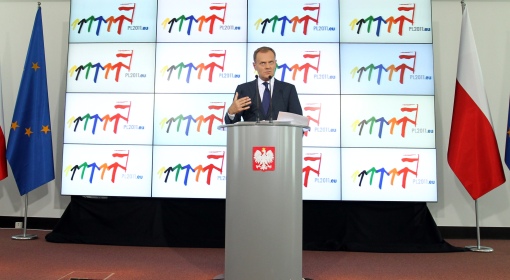
PM Tusk outlines EU presidency goals in Warsaw, Tuesday; photo - PAP/Radek Pietruszka
Prime Minister Donald Tusk outlined the plan of work at a press conference on Tuesday for the EU presidency, which Poland takes over from Hungary on 1 July. The presidency will concentrate on agricultural policy, energy security, the 2014 - 2020 EU budget, neighbourhood policy in relation to nations to the east and south of the bloc and a debate on the “values based on the teachings of John Paul II.”
PM Tusk hoped that a conclusion to EU accession negotiations with Croatia would be included in the six-month period.
When asked whether the autumn’s general election in Poland would disrupt the work plan, Tusk said that, “the presidency will not be the success of this or any other government. And it should not be used by those in power […] or by the opposition during the election campaign,” he added.
Though the presidency of the Council of the European Union, to give it its formal title, has no executive powers - its main role is to organise and chair council meetings - Prime Minister Tusk said that Poland would try and use the period to defend “cohesion policy”, which includes funding for projects in less developed regions of the 27 nation bloc, of which Poland is the largest benefactor.
“We will try and convince our EU partners to sustain and strengthen the cohesion policy […]. Which means not just large amounts of money for countries that use it, but is obviously in the interest of the EU as an organization," Tusk said.
France, Germany and many of the ‘old EU nations’ intend to limit the amount spent in the budget on cohesion policy, however.
Budget battle
On the size of the future EU budget as a whole, which Germany and the UK want to make cuts to in the 2014-20 period, Tusk said that finding new sources of income will be difficult at a time of austerity programmes being carried out by national governments.
“I have the impression that there is little chance of finding a clear consensus within the EU to find further sources of funding [such as a tax on financial transactions] so our main goal is to try and defend the size of the budget,” Tusk said.
“But we need to find an agreement and it will be one of the main tasks of the Polish presidency to build the foundations of such an agreement."
Another key priority of the EU presidency is a “Secure Europe”, said Poland’s prime minister. The conflict in Libya reminded us, he said, of the need for a coordinated strategy on defence.
Warsaw wants to initiate a debate on creating an EU rapid reaction defence force, using the so-called Weimar Battlegroup (Poland, France, Germany), which Warsaw, Paris and Berlin want to establish by 2013, as a model.
"I must admit however that we all realize that our presidency will also be marked by things which we will not anticipate and are impossible to predict," Tusk concluded. (pg)